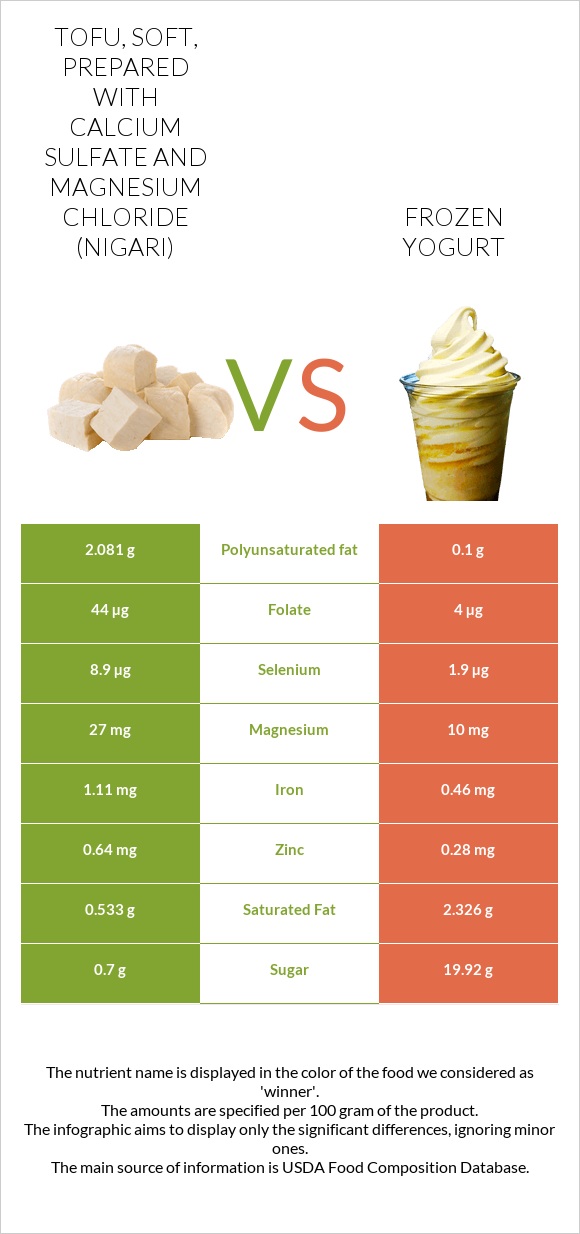Tofu, soft, prepared with calcium sulfate and magnesium chloride (nigari) vs. Frozen yogurt — In-Depth Nutrition Comparison
Compare
The main differences between tofu, soft, prepared with calcium sulfate and magnesium chloride (nigari) and frozen yogurt
- Tofu, soft, prepared with calcium sulfate and magnesium chloride (nigari) is richer in copper, selenium, folate, iron, and polyunsaturated fat, yet frozen yogurt is richer in vitamin B2.
- Daily need coverage for copper for tofu, soft, prepared with calcium sulfate and magnesium chloride (nigari) is 16% higher.
- Tofu, soft, prepared with calcium sulfate and magnesium chloride (nigari) contains 21 times more polyunsaturated fat than frozen yogurt. Tofu, soft, prepared with calcium sulfate and magnesium chloride (nigari) contains 2.081g of polyunsaturated fat, while frozen yogurt contains 0.1g.
- Tofu, soft, prepared with calcium sulfate and magnesium chloride (nigari) contains less saturated fat.
Food types used in this article are Tofu, soft, prepared with calcium sulfate and magnesium chloride (nigari) and Frozen yogurts, flavors other than chocolate.
Infographic

Infographic link
Mineral Comparison
Mineral comparison score is based on the number of minerals by which one or the other food is richer. The "coverage" charts below show how much of the daily needs can be covered by 300 grams of the food.
| Contains more MagnesiumMagnesium | +170% |
| Contains more IronIron | +141.3% |
| Contains more CopperCopper | +1644.4% |
| Contains more ZincZinc | +128.6% |
| Contains less SodiumSodium | -87.3% |
| Contains more ManganeseManganese | +∞% |
| Contains more SeleniumSelenium | +368.4% |
| Contains more PotassiumPotassium | +30% |
Vitamin Comparison
Vitamin comparison score is based on the number of vitamins by which one or the other food is richer. The "coverage" charts below show how much of the daily needs can be covered by 300 grams of the food.
| Contains more Vitamin B1Vitamin B1 | +17.5% |
| Contains more Vitamin B3Vitamin B3 | +664.3% |
| Contains more Vitamin B5Vitamin B5 | +∞% |
| Contains more Vitamin B6Vitamin B6 | +30% |
| Contains more Vitamin KVitamin K | +566.7% |
| Contains more FolateFolate | +1000% |
| Contains more CholineCholine | +18.6% |
| Contains more Vitamin CVitamin C | +250% |
| Contains more Vitamin AVitamin A | +∞% |
| Contains more Vitamin EVitamin E | +800% |
| Contains more Vitamin DVitamin D | +∞% |
| Contains more Vitamin B2Vitamin B2 | +386.5% |
| Contains more Vitamin B12Vitamin B12 | +∞% |
All nutrients comparison - raw data values
| Nutrient |  |
 |
DV% diff. |
| Manganese | 0.389mg | 17% | |
| Copper | 0.157mg | 0.009mg | 16% |
| Selenium | 8.9µg | 1.9µg | 13% |
| Polyunsaturated fat | 2.081g | 0.1g | 13% |
| Vitamin B2 | 0.037mg | 0.18mg | 11% |
| Folate | 44µg | 4µg | 10% |
| Saturated fat | 0.533g | 2.326g | 8% |
| Iron | 1.11mg | 0.46mg | 8% |
| Protein | 7.17g | 3g | 8% |
| Carbs | 1.18g | 21.6g | 7% |
| Vitamin A | 0µg | 49µg | 5% |
| Cholesterol | 0mg | 13mg | 4% |
| Magnesium | 27mg | 10mg | 4% |
| Vitamin B12 | 0µg | 0.07µg | 3% |
| Vitamin B3 | 0.535mg | 0.07mg | 3% |
| Calories | 61kcal | 127kcal | 3% |
| Zinc | 0.64mg | 0.28mg | 3% |
| Sodium | 8mg | 63mg | 2% |
| Vitamin C | 0.2mg | 0.7mg | 1% |
| Calcium | 111mg | 100mg | 1% |
| Choline | 27.4mg | 23.1mg | 1% |
| Vitamin K | 2µg | 0.3µg | 1% |
| Vitamin B6 | 0.052mg | 0.04mg | 1% |
| Vitamin B5 | 0.051mg | 1% | |
| Potassium | 120mg | 156mg | 1% |
| Vitamin B1 | 0.047mg | 0.04mg | 1% |
| Fiber | 0.2g | 0g | 1% |
| Vitamin D | 0µg | 0.1µg | 1% |
| Vitamin E | 0.01mg | 0.09mg | 1% |
| Fats | 3.69g | 3.6g | 0% |
| Net carbs | 0.98g | 21.6g | N/A |
| Vitamin D | 0IU | 3IU | 0% |
| Sugar | 0.7g | 19.92g | N/A |
| Phosphorus | 92mg | 89mg | 0% |
| Monounsaturated fat | 0.814g | 0.986g | 0% |
| Tryptophan | 0.102mg | 0% | |
| Threonine | 0.268mg | 0% | |
| Isoleucine | 0.324mg | 0% | |
| Leucine | 0.498mg | 0% | |
| Lysine | 0.431mg | 0% | |
| Methionine | 0.084mg | 0% | |
| Phenylalanine | 0.319mg | 0% | |
| Valine | 0.331mg | 0% | |
| Histidine | 0.191mg | 0% |
Macronutrient Comparison
Macronutrient breakdown side-by-side comparison
Protein:
7.17 g
Fats:
3.69 g
Carbs:
1.18 g
Water:
87.26 g
Other:
0.7 g
Protein:
3 g
Fats:
3.6 g
Carbs:
21.6 g
Water:
71.2 g
Other:
0.6 g
| Contains more ProteinProtein | +139% |
| Contains more WaterWater | +22.6% |
| Contains more OtherOther | +16.7% |
| Contains more CarbsCarbs | +1730.5% |
~equal in
Fats
~3.6g
Fat Type Comparison
Fat type breakdown side-by-side comparison
Saturated fat:
Sat. Fat
0.533 g
Monounsaturated fat:
Mono. Fat
0.814 g
Polyunsaturated fat:
Poly. Fat
2.081 g
Saturated fat:
Sat. Fat
2.326 g
Monounsaturated fat:
Mono. Fat
0.986 g
Polyunsaturated fat:
Poly. Fat
0.1 g
| Contains less Sat. FatSaturated fat | -77.1% |
| Contains more Poly. FatPolyunsaturated fat | +1981% |
| Contains more Mono. FatMonounsaturated fat | +21.1% |